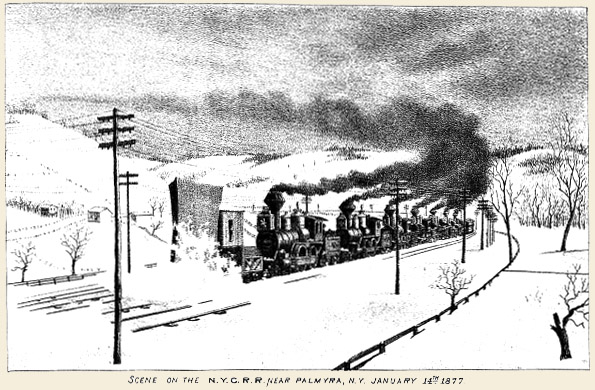|
Snowed in—Again
A Day upon the Watertown & Rome
Railway
compiled by
Jefferson County Journal, Adams, N.Y., Thurs., Feb. 28, 1856
To the Editors Morning (Albany) Argus:
The heading of this letter may seem commonplace to the quiet citizen who tarries
at home during snow storms, and hears no worse sounds than the crackling fire
as it roars up the chimney, or who, for want of better occupation, like another
marvel, build glorious palaces and cities out of the ashes of a coal fire.
The storm had laid an embargo on all railroads, and none were so thoroughly
blockaded as the Watertown & Rome. Our first sight at the depot was five
enormous engines, with the snow-plow as a leader. We say the snowplow, for
this is an institution which is peculiar to the W.& R. railway - everything
which had been tried was found useless, and the busy brain of those Yankees
of the Rome shop conceived this invention.
It grew out of the associate counsel of men who have lost half their individuality
in their generous rivalry for the company, which they call our road. The snow
plow is a small house on wheels, with a front shaped like a monster plow, and
its sides ribbed together like the bow of one of Uncle Sam's frigates. It’s
made strong as wood as iron can make it, and weighs near ten tons.

Winter railroading cene showing snow plow at work in upstate New York
in the aftermath of the Blizzard of 1877. From the
1878 History of Wayne County.
On either side are wings, which can be extended or withdrawn at pleasure,
and the bearing of the weight is such as to keep it close to the track, very
much as a weight on the plow beam causes it to hug the hard green sward. With
some curiosity, and much more fear, we accepted the invitation of our railroad
friends and entered the cabin of this Arctic traveler.
Think of it! Five engines behind you, each carrying from 100 to 120 pounds
of steam, and before you, Alps upon Alps of snow; where there was only two
or three feet of snow, and the country open, we whirled along at ordinary speed,
plunging into drifts like a frolicsome boy, and sending the snow balls over
fences 30 or 40 feet distant, and surrounding our house with clouds of the
sparkling snow flakes.
There are long wastes of snowy mountains on this road which would defy all
ordinary railway power; when we came upon these, Greek met Greek, and here
came the tug of war. The train came in at its usual speed, the snow fairly
covering us, and you could only think of a vessel completely submerged in its
white foam.
Slower, slower, almost stopping, moving like a snail, on we went, until at
last we shot out of the mountain, each engine giving a hoarse puff as of a
cry of victory. There were places too difficult even for this snowplow, where
for miles there is a canal with banks 10, 12, 15, and even 20 feet high. In
such places we were forced to stop and clear the snow from our wheels, but
in no place was there any shoveling in front of the plow.
We have never spent a more exciting day. The train reached Watertown at about
4 o'clock. There is no railway where all hands work with such good will as
upon this. It would be unjust to give particular praise where all deserve credit,
but we say, that for companions in a snow squall, give us the operatives and
machines of the Watertown & Rome Railway.
Feb. 19, 1856,
A PASSENGER.
|